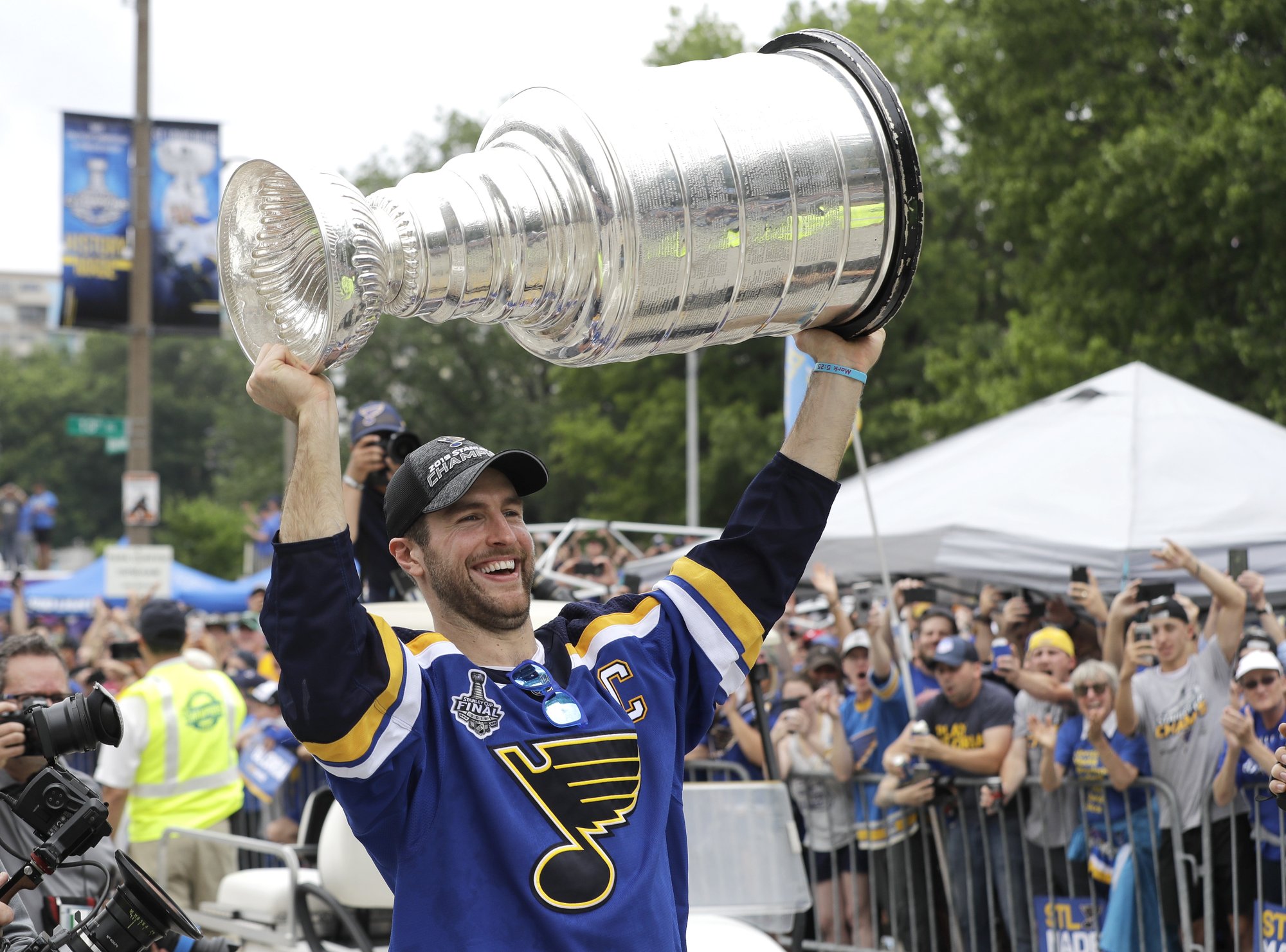
St. Louis Blues defenseman and captain Alex Pietrangelo carries the Stanley Cup during the Blues’ NHL hockey Stanley Cup victory celebration in St. Louis on Saturday, June 15, 2019. (AP Photo/Darron Cummings)
ST. LOUIS — After a half-century of disappointment, even Mother Nature didn’t dare spoil the celebration of St. Louis’ first-ever Stanley Cup championship.
A morning downpour fizzled to a light rain by the time the parade began Saturday, and the sun popped out just as a rally was starting before a massive crowd on the grounds of the Gateway Arch.
The Blues ended one of sports’ longest championship droughts on Wednesday by beating the Boston Bruins 4-1 in Game 7 of the Stanley Cup Final, the first title for a franchise that joined the NHL 52 years ago. Fans poured into the city for the celebration. There were no immediate crowd estimates, but local leaders’ expectations of at least a half-million people appeared to be spot on.
The long-awaited championship stirred strong emotions in St. Louis, a city still smarting from the departure of the NFL’s Rams in 2016. The loss of the football team seemed to strengthen the fans’ bonds to the Blues and their beloved baseball team, the Cardinals.
“I’m so happy for the city and the fans here,” coach Craig Berube said at the rally. “They deserve it. But more than anything I’m so happy for our players, because of how hard they’ve played, the character and leadership coming through, winning that cup.”
Ryan Korte, a 56-year-old letter carrier from the St. Louis suburb of Belleville, Illinois, said he wasn’t sure he’d ever get to see the Blues win the cup.
“I was starting to wonder,” Korte said as he waved a towel while standing on a ledge, straining to see the parade. “A lot of disappointments. They’ve had some good teams and they always let us down.”
Not this time.
“This is bigger than the World Series,” Korte said.
That may sound strange in St. Louis, which has long been considered a baseball haven thanks to the Cardinals’ 11 World Series titles. It sure looked like a hockey town on Saturday, though, as fans shouted “Let’s Go Blues!” and danced to “Gloria,” the 1982 Laura Branigan hit that became the Blues’ unofficial victory song.
Forward Ryan O’Reilly, who won the Conn Smythe Trophy as the most valuable player of this year’s playoffs, carried the Stanley Cup to fans lining Market Street to let them touch it.
“The Blues have an amazing fan base,” said Michael DeHeer, 52, of St. Louis. “This place is ready to explode.”
It has been quite a journey since the Blues joined the NHL in 1967 as one of six expansion teams that year that doubled the size of the league. The original six teams were kept in one division, the six new teams in another, ensuring that an expansion team would play for the Stanley Cup.
The Blues loaded their roster with aging veterans and it paid off: They played for the Stanley Cup in each of their first three seasons. They didn’t win a game, though, going a combined 0-12 in those three series.
What followed was a 49-year stretch in which the Blues didn’t make the finals — a drought made even more remarkable because the team only missed the playoffs nine times during that span.
This year’s season didn’t start out promising, as a sluggish start got coach Mike Yeo fired in November.
Berube took over as interim coach — a title he still holds, though the interim tag is expected to be lifted soon. Improvement didn’t come immediately — the Blues were dead last in the standings on Jan. 3, the middle of the season. Days later, an unheralded rookie goaltender named Jordan Binnington was called up. He won his first game in a shutout.
Soon, with Binnington taking over as the lead goalie, the Blues went on a franchise-record 11-game winning streak and stayed hot through their playoff run.
Binnington, known for his calm demeanor, finally let loose Saturday.
“You want to see some (expletive) emotion?” he asked the rally crowd. “We’re Stanley Cup champions, baby!”
The Blues joined a list of other sports franchises to recently end long championship droughts. The Chicago Cubs’ win in the 2016 World Series ended a 108-year run of futility. The Philadelphia Eagles won the 2018 Super Bowl, their first championship in 58 years. Last year’s Stanley Cup winners, the Washington Capitals, won for the first time since joining the NHL in 1974.

